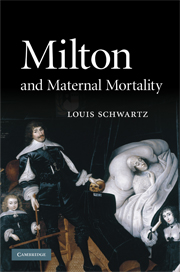Book contents
- Frontmatter
- Contents
- Acknowledgments
- Abbreviations
- Introduction
- PART I BEHIND THE VEIL: CHILDBIRTH AND THE NATURE OF OBSTETRIC ANXIETY IN EARLY MODERN ENGLAND
- PART II “SCARCE-WELL-LIGHTED FLAME”: THE REPRESENTATION OF MATERNAL MORTALITY IN MILTON'S EARLY POETRY
- 4 “Too much conceaving”: Milton's “On Shakespear”
- 5 “Tears of perfect moan”: Milton and the Marchioness of Winchester
- 6 “Farr above in spangled sheen”: A Mask and its Epilogue
- PART III “CONSCIOUS TERROURS”: THE PROBLEM OF MATERNAL MORTALITY IN MILTON'S LATER POETRY
- Index
- References
5 - “Tears of perfect moan”: Milton and the Marchioness of Winchester
Published online by Cambridge University Press: 04 December 2009
- Frontmatter
- Contents
- Acknowledgments
- Abbreviations
- Introduction
- PART I BEHIND THE VEIL: CHILDBIRTH AND THE NATURE OF OBSTETRIC ANXIETY IN EARLY MODERN ENGLAND
- PART II “SCARCE-WELL-LIGHTED FLAME”: THE REPRESENTATION OF MATERNAL MORTALITY IN MILTON'S EARLY POETRY
- 4 “Too much conceaving”: Milton's “On Shakespear”
- 5 “Tears of perfect moan”: Milton and the Marchioness of Winchester
- 6 “Farr above in spangled sheen”: A Mask and its Epilogue
- PART III “CONSCIOUS TERROURS”: THE PROBLEM OF MATERNAL MORTALITY IN MILTON'S LATER POETRY
- Index
- References
Summary
On April 15, 1631, Lady Jane Paulet, wife of Lord John Paulet, fifth Marquis of Winchester and daughter of Thomas, first Viscount Savage of Rock Savage, Cheshire, died giving birth to her second son. She was twenty-three years old (about the same age as Milton), just one month short of her twenty-fourth birthday. According to sources close to the family, her son was born dead, and the difficult stillbirth was complicated by a fever and the lancing of an “impostume” on her cheek. She was delivered of her dead son before she died. As Parker notes, the story seems to have touched a number of people, for Lady Jane was mourned in verse by at least six poets whose poems survive; these include elegies by Ben Jonson, William Davenant, an obscure Catholic poet named Walter Colman, and two even more obscure young men: a Mr. John Eliot, about whom almost nothing is known, and, of course, John Milton. There is also a short, anonymous Latin epitaph in William Camden's Remaines Concerning Britaine.
The poem that Milton contributed to this set, “An Epitaph on the Marchioness of Winchester” (hereafter “An Epitaph”), is not a poem that has attracted the full attention of Miltonists over the years – it has rarely occasioned more than a paragraph or a passing aside.
- Type
- Chapter
- Information
- Milton and Maternal Mortality , pp. 91 - 140Publisher: Cambridge University PressPrint publication year: 2009



